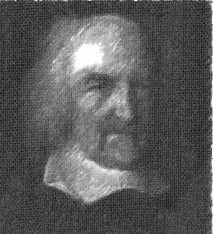The Educational Theory of Thomas Hobbes
Analyst: Amy Kauffman |
 |
©2000 NewFoundations
The Educational Theory of Thomas Hobbes
Analyst: Amy Kauffman |
 |
RETURN
8/18/11
I. Theory of Value
Morals surpass all else (A:1).
People are powerfully moved by moral interests. Proper conception of these interests is essential to the maintenence of civil order (A:159).
Pursuing a process of socialization, or of moral education, encourages properly conceived interests form (A:159).
... empirical sciences (H:53).
... mathematical abstractions (H:53).
2. physics (optics) first to discover the causes of sense perceptions.
Every man will dread and distrust each other (1:42).
All that is, is material (A:3).
The contents of the world could in principle be comprehensively described making reference only to bodies and their motions (A:3). Saw the human struggle for security and peace as a human struggle (A:3).
The behavior of men can be explained by the science of mechanics and the geometrical deduction (G:171).
Education is socialization (A:251). -Analysis can disclose universal things (C:57). - People learn by: problem-solving (H:53) analysis (H:53).
- Education involves not only the presentation of ideas,
but also their inculcation (A:162).
- Successful teachers proceed from most low and humble principles; and so on (C:44).
- In the method of teaching, not the method of discovery or intervention, the syllogisms are useful (C:44).
- Public Ministers have the authority to teach or to enable others to teach the people their duty to the Sovereign Power, and instruct them in the knowledge of what is right and wrong (E:167).
- Common-peoples are like clean paper, fit to receive whatsoever by Public Authority shall be imprinted in them (E:233).
- A society has no substantial reality of its own (F:111).
- The ills of a society on the edge of civil war might be cured if men could grasp a rationale of society as clear and as forcefully convincing as a geometer's proof (G: 171 ) .
The state of nature was a state of war, which could be ended only if men agreed to give their liberty into the hands of a sovereign (G:171). All social disorder is the result of bad education (A:160).
Children should, after education is complete, acknowledge the benefit of their education, by external signs of honor (E:235). Common-peoples learn from those of Sovereign Power (E:233).
People are capable of forming, and acting on transcendent interests (A:1). Transcendent interests caused civil wars. Any permanent solution to war would need to address the disruption generated by such conflicts of transcendent interests (A:1).
The solution is to reduce people's conceptions and interests by a process of education that continually generates consensus (A:2). Education can cause consensus or destroy consensus (A:2).
Work Cited
A: Lloyd, S.A. (1992) Ideals as Interests in Hobbe's Leviathan: The Power of Mind Over Matter. New York: Cambridge University Press, (1-320).
B: Hobbes, T. (1930) Selections. New York: Charles Scribner's Sons, (1-5).
C: Sorell, T. (1986) The Arguments of the Philosophers:
Hobbes. New York: Routledge & Kegan Paul, (42-44).
D: Laird, J. (1968) Hobbes. New York: Russell & Russell, (145).
E: Hobbes, T. (1991) Leviathan. New York: Cambridge University Press, (167-406).
F: Clabaugh, G.K., & Rozycki, E.G. (1990) Understanding Schools. New York: Harper & Row Publishers, (111).
G: Collier's Encyclopedia (1993) New York: P.F. Collier, Inc. V12. (170-172).
H : Ross, Schneider, & Waldman. (1974) Thomas Hobbes In His Time. Minnesota: University of Minnesota Press. (52).
I: Encyclopedia of Philosophy. (30-43)